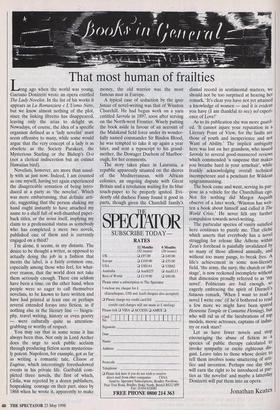That most human of frailties
Long ago when the world was young, Gaetano Donizetti wrote an opera entitled The Lady Novelist. In the list of his works it appears as La Romanziera e L'Uomo Nero, but we know almost nothing of the plot, since the linking libretto has disappeared, leaving only the arias to delight us. Nowadays, of course, the idea of a specific organism defined as a 'lady novelist' must seem offensive to many, while some would argue that the very concept of a lady is as obsolete as the Society Parakeet, the Mysterious Starling or the Bishop's 0-o (not a clerical indiscretion but an extinct Hawaiian bird).
Novelists, however, are more than usual- ly with us just now. Indeed, I am counted as one myself, having yet again experienced the disagreeable sensation of being intro- duced at a party as 'the novelist'. Which was more embarrassing, that definite arti- cle, suggesting that the person shaking my hand ought instantly to have attached my name to a shelf full of well-thumbed paper- back titles, or the noun itself, implying my claim to a professional status as somebody who has completed a mere two novels, published one of them and is currently engaged on a third?
I'm alone, it seems, in my distaste. The desire to be thought a writer, as opposed to actually doing the job in a fashion that merits the label, is a fairly common one, especially among those who feel, for what- ever reason, that the world does not take them seriously enough. There can seldom have been a time, on the other hand, when people were so eager to call themselves novelists, to be known to have written and have had printed at least one or perhaps several extended forays into fiction, as if nothing else in the literary line — biogra- phy, travel writing, history or even poetry — were culturally quite as attention- grabbing or worthy of respect.
You may say that in some sense it has always been thus. Not only in Lord Archer does the urge to seek public acclaim through producing fiction seem mysterious- ly potent. Napoleon, for example, got as far as writing a romantic tale, Clisson et Eugenie, which interestingly foreshadowed events in his private life. Garibaldi com- pleted three novels, the first of which, Clelia, was rejected by a dozen publishers, bespeaking courage on their part, since by 1868 when he wrote it, apparently to make money, the old warrior was the most famous man in Europe.
A typical case of seduction by the ignis fatuus of novel-writing was that of Winston Churchill. He had begun work on a yarn entitled Savrola in 1897, soon after serving on the North-west Frontier. Wisely putting the book aside in favour of an account of the Malakand field force under its wonder- fully named commander Sir Bindon Blood, he was tempted to take it up again a year later, and sent a typescript to his grand- mother, the Dowager Duchess of Marlbor- ough, for her comments.
The story takes place in Laurania, a republic apparently situated on the shores of the Mediterranean, with African colonies, an ongoing dispute with Great Britain and a revolution waiting for its blue touch-paper to be properly ignited. Evi- dently old duchess Fanny found it good in parts, though given the Churchill family's dismal record in sentimental matters, we should not be too surprised at hearing her remark, 'It's clear you have not yet attained a knowledge of women — and it is evident you have (I am thankful to see) no' experi- ence of Love!'
As to its publication she was more guard- ed. 'It cannot injure your reputation in a Literary Point of View, for the faults are those of youth and inexperience and not Want of Ability.' The implicit ambiguity here was lost on her grandson, who issued Savrola to several good-mannered reviews which commended 'a suspense that makes you breathe hard in your armchair', while frankly acknowledging overall technical incompetence and a penchant for Wildean epigrammatising.
The book came and went, serving its pur- pose as a vehicle for the Churchillian ego. Not for nothing did Margot Asquith observe of a later work, 'Winston has writ- ten a book about himself and called it The World Crisis.' He never felt any further compulsion towards novel-writing. The particular species of vanity satisfied here continues to puzzle me. That cliche which asserts that everybody has a novel struggling for release like Athene within Zeus's forehead is painfully invalidated by so many of those allowed annually, and without too many pangs, to break free. A life's achievement in some non-literary field, 'the army, the navy, the church or the stage', is now reckoned incomplete without that dimension proudly referred to as `my novel'. Politicians are bad enough, so eagerly embracing the spirit of Disraeli's fatuous remark, 'When I want to read a novel I write one' (if he'd bothered to read a few more we might have been spared Henrietta Temple or Contarini Fleming), but who will rid us of the lucubrations of tap models, movie actresses, captains of indus- try or rock stars? Let us have fewer novels and stop encouraging the abuse of fiction as a species of public therapy calculated to invoke sympathy or excite righteous dis- gust. Leave tales to those whose desire to tell them involves some smattering of arti- fice and invention. Perhaps one day they will earn the right to be introduced at par- ties as `the novelist' and maybe a latterday Donizetti will put them into an opera.
Jonathan Keates


































































 Previous page
Previous page